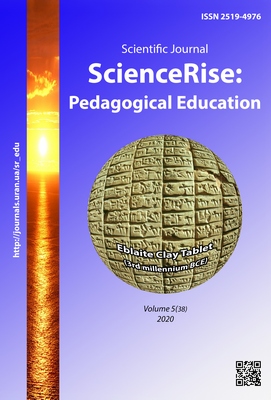Analysis of the possibilities of the MOODLE learning management system for organization of distance learning in the conditions of the university
DOI:
https://doi.org/10.15587/2519-4984.2020.213100Keywords:
professional training, distance learning, learning management system, MOODLE, module, courseAbstract
The modern world has changed dramatically with the widespread introduction of information and communication technologies. Today, an effective learning process without the use of modern technologies is unthinkable. Learning management systems are a bright representative of modern technologies, on the basis of which it is possible to organize the interaction of all participants in the learning process in the global Internet. The search for new approaches to the use of learning management systems can further enhance the effect of the use of modern information and communication technologies in the organization of the educational process.
The article gives a general description of the MOODLE training management system and the main elements of the course: questionnaire database; external tool; glossary; task; lecture; feedback; survey; SCORM package; seminar; test; forum; chat. Among the resources were identified: hyperlink; book; IMS content package; explanations; page; file. The practical use of the listed elements of the course of the MOODLE learning management system allows to fully implement distance learning and effective interaction between student and teacher.
The structure of the course includes the necessary set of structural elements (lectures, practical work, independent work, control of knowledge on the basis of tests) for the organization of distance learning in the conditions of higher educational institution.
A significant advantage of the introduction of MOODLE in the traditional educational process is that, without violating its course and principles, it greatly enriches it due to its rich information, communication and pedagogical capabilities. Distance learning with the help of MOODLE allows you to organize productive independent work of the student to master the discipline. Through the means of access to interactive learning elements and MOODLE resources, students have the opportunity to optimize the assimilation of educational material in preparation for classes, and with the help of control elements - to improve the quality of self-control
References
- Starichenko, B. E., Semenova, I. N., Slepukhin, A. V. (2015). Concering the interrelation of e-learning concepts in higher education. The Education and Science Journal, 9, 51–68. doi: http://doi.org/10.17853/1994-5639-2014-9-51-68
- Zaitseva, O. N. (2012). Ispolzovanie LMS Moodle v obrazovanii. Obuchenie i vospitanie: metodiki i praktika, 2. Available at: https://cyberleninka.ru/article/n/ispolzovanie-lms-moodle-v-obrazovanii Last accessed: 13.07.2020
- Mullagaliev, N. A., Urazlina, R. V. (2017). Ob otnoshenii studentov k vvedeniiu elementov distantsionnogo obucheniia v vuze. Innovatsionnaia nauka, 1-1, 188–191. Available at: https://cyberleninka.ru/article/n/ob-otnoshenii-studentov-k-vvedeniyu-elementov-distantsionnogo-obucheniya-v-vuze Last accessed: 15.07.2020
- Shurygin, V. Iu. (2016). O vozmozhnosti ispolzovaniia vuzovskikh elektronnykh obrazovatelnykh kursov v protsesse prepodavaniia fiziki v shkole. Fizika v shkole, 4, 57–60.
- Shaikina, O. I. (2016). Otkrytye obrazovatelnye resursy na osnove smeshannogo obucheniia v Tomskom politekhnicheskom universitete. Azimut nauchnykh issledovanii: pedagogika i psikhologiia, 5 (1 (14)), 134–136.
- Kartuzova, T. V., Merlina, N. I., Seliverstova, L. V. (2016). Ispolzovanie nekotorykh elementov sistemy MOODLE v rabote so studentami zaochnogo otdeleniia pri izuchenii matematicheskikh distsiplin. Karelskii nauchnii zhurnal, 5 (2 (15)), 34–36.
- Kravchenko, G. V. (2013). Ispolzovanie distantsionnoi sredy Moodle v obrazovatelnom protsesse studentov dnevnoi formy obucheniia. Izvestiia Altaiskogo gosudarstvennogo universiteta, 2 (78), 23–25.
- Granitov, V. M., Nikulina, M. A., Bobrovskii, E. A. (2013). Ispolzovanie platformy Moodle dlia distantsionnogo obucheniia na kafedre infektsionnykh boleznei. Infektsionnye bolezni: Novosti. Mneniia. Obuchenie, 1 (2). Available at: https://cyberleninka.ru/article/n/ispolzovanie-platformy-moodle-dlya-distantsionnogo-obucheniya-na-kafedre-infektsionnyh-bolezney Last accessed: 13.07.2020
- Lobanov, Iu. Ia., Sharonova, A. V., Mironova, O. V., Moskalenko, I. S., Shulgov, Iu. I. (2018). Ispolzovanie elementov distantsionnogo obucheniia v protsesse osvoeniia distsipliny «Elektivnye kursy po fizicheskoi kulture i sportu». Uchenye zapiski universiteta Lesgafta, 12 (166), 144–148. Available at: https://cyberleninka.ru/article/n/ispolzovanie-elementov-distantsionnogo-obucheniya-v-protsesse-osvoeniya-distsipliny-elektivnye-kursy-po-fizicheskoy-kulture-i-sportu Last accessed: 13.07.2020
- Bobunova, A. S. (2017). Vospitatelnye vozmozhnosti i funktsii virtualnoi obrazovatelnoi sredy Moodle v usloviiakh inoiazychnogo obrazovaniia shkolnikov. Kant, 3 (24). Available at: https://cyberleninka.ru/article/n/vospitatelnye-vozmozhnosti-i-funktsii-virtualnoy-obrazovatelnoy-sredy-moodle-v-usloviyah-inoyazychnogo-obrazovaniya-shkolnikov Last accessed: 15.07.2020
Downloads
Published
How to Cite
Issue
Section
License
Copyright (c) 2020 Sergei Zelinskiy

This work is licensed under a Creative Commons Attribution 4.0 International License.
Our journal abides by the Creative Commons CC BY copyright rights and permissions for open access journals.
Authors, who are published in this journal, agree to the following conditions:
1. The authors reserve the right to authorship of the work and pass the first publication right of this work to the journal under the terms of a Creative Commons CC BY, which allows others to freely distribute the published research with the obligatory reference to the authors of the original work and the first publication of the work in this journal.
2. The authors have the right to conclude separate supplement agreements that relate to non-exclusive work distribution in the form in which it has been published by the journal (for example, to upload the work to the online storage of the journal or publish it as part of a monograph), provided that the reference to the first publication of the work in this journal is included.







